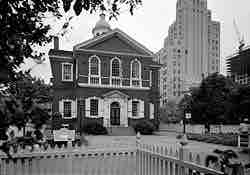The first Continental Congress was influenced by Correspondence Committees. These served an important role in the Revolution by disseminating the colonial interpretation of British actions to the colonies and foreign governments. The Committees of Correspondence rallied opposition on common causes and established plans for collective action. The group of committees was the beginning of what later became a formal political union among the colonies. About seven to eight thousand patriots served on these committees at the colonial and local levels. These patriots comprised most of the leadership in colonial communities while the loyalists were excluded. Committee members became the leaders of the American resistance to the British. When Congress decided to boycott British products, the colonial and local Committees took charge by examining merchant records and publishing the names of merchants who attempted to defy the boycott. The Committees promoted patriotism and home manufacturing by advising Americans to avoid luxuries. The committees gradually extended their influence to many aspects of American public life.
In June 1774, the Virginia and Massachusetts assemblies independently proposed an intercolonial meeting of delegates from the several colonies to restore the union between Great Britain and the American colonies. In September, the first Continental Congress, composed of delegates from twelve of the thirteen colonies—all except Georgia—met in Philadelphia The assembly adopted what has become to be known as the Declaration and Resolves of the First Continental Congress. The document, addressed to his Majesty and to the people of Great Britain, included a statement of rights and principles, many of which were later incorporated into the Declaration of Independence and Federal Constitution. When the first Congress adjourned, it stipulated another Congress would meet if King George III did not acquiesce to the demands set forth in the Declaration of Resolves.

Carpenter's Hall
The first Continental Congress met in Carpenter's Hall in Philadelphia, PA.
By the time the second Congress met, the Revolutionary War had already begun, and the issue of independence, rather than a redress of grievances, dominated the debates.